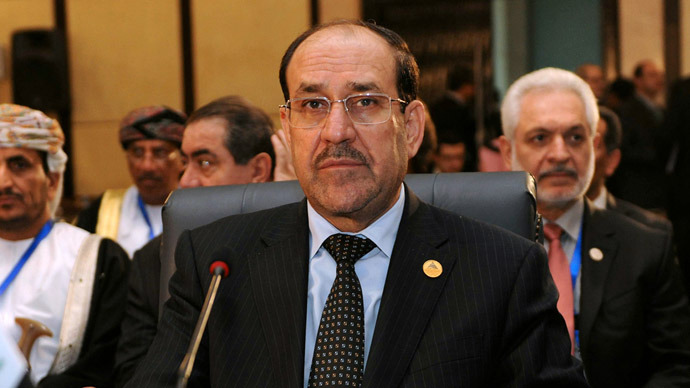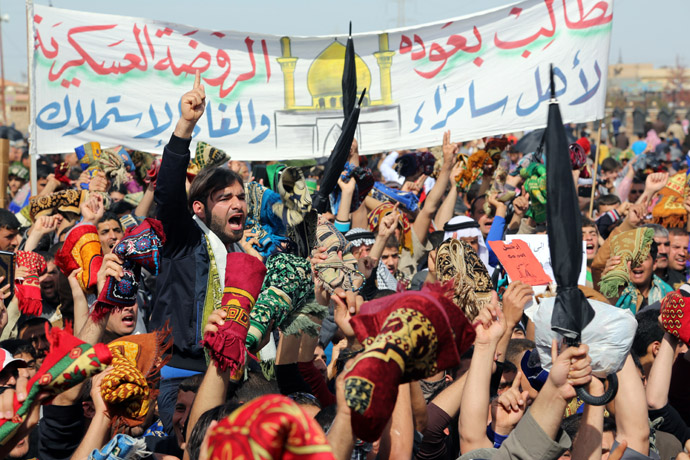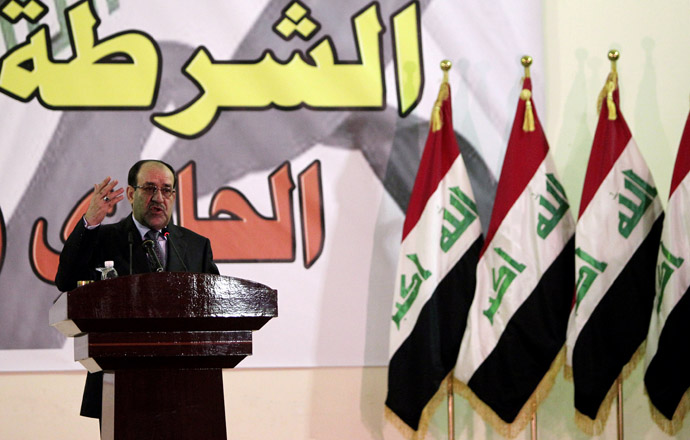‘Al-Maliki’s resignation could return stability to Iraq’ – former Iraqi PM

Prime Minister Nouri al-Maliki is keeping all the reins of power in his hands, and while Iraq continues to go downhill his resignation looks the best solution, former Iraqi PM and leader of the al-Iraqiya Alliance Ayad Allawi told RT.
Allawi believes al-Maliki is the major obstacle to “building a
new, viable state based on a new constitution and equal
participation of all the national forces.”
RT:What’s your outlook for Iraq, considering the violence in Hawijah and the ongoing political disputes? Some say the country is headed for a split or may be even civil war. Do you see any ways to end this crisis?
Ayad Allawi: I think that all these events – the massacre in Hawijah, deteriorating security and strong political differences – are symptoms of a serious disease. It began with the downfall of the previous regime and that’s when the political process took a wrong turn. What we saw was the marginalization of certain sectarian groups within the country, political sectarianism, and disrespect for the interests of millions of Iraqis, including former servicemen, journalists, Ba'ath Party members. The target was to cleanse the Iraqi political life of Ba'athist influence. So the political system relied on sectarianism, nepotism, and personal loyalty. And at the same time, the state and all its institutions were being dismantled. Because of this misguided political process, we still have an unsettled country where fully-operational institutions and professional organizations are still missing. It is a disease but the country is not getting any medication. And so the destruction of Iraq continues.
RT:Should we blame the US occupation for what is happening in Iraq today?
AA: The US made three fatal mistakes in Iraq. First, dismantling the Iraqi state and its institutions. The second mistake was ridding the political system of all Ba’ath Party elements. The third mistake was to allow the current regime to implement its sectarian policies. After the US withdrew its troops, this sectarianism has spread across all levels of political power.
RT:The US is no longer present in Iraq. Who’s been responsible for new crises breaking out in Iraq since then?
AA: As you know, when the foundation of a building is faulty, everything built above will be faulty as well. So what we see now – sectarianism, disrespect for the basic principles of nation-building, an unstable political situation, deteriorating security – that’s all down to the fact that we don’t have a viable state and institutions. The political process, which is so critical for building a state, is faulty. Certain forces benefit from the current situation and want to keep it that way. I am talking about some of our neighbors that want to harm Iraq. There are also certain groups inside Iraq that have received privileges and more leverage and are trying to maintain their position. In order to achieve that, they seek to marginalize certain communities, trying to drive a wedge between different religious groups.

Al-Maliki’s responsibility
RT:There are those in the political establishment who accuse Prime Minister al-Maliki of all the disasters going on in the country, though in fact these people are also part of the executive, legislative and judiciary. So why are they trying to shift the blame onto the Prime Minister?
AA: Because it’s the leader and the ruling party that bears the bulk of the responsibility. Now, why is exactly Mr. al-Maliki to blame? The matter is, he’s not only Prime Minister; he is also Commander-in-Chief, Defense Minister, Minister of the Interior, Director of the National Security Council of Iraq, and he is also in charge of security and intelligence services. These agencies have been involved in operations nicknamed ‘Baghdad’, ‘Tigris’, ‘Euphrates’, and others. He is the one who defines the nation’s policies and goals. Of course, he is the one with the most responsibility. His bloc, his party are the ones in charge. He is the head of the state, he controls everything. Unfortunately, the cooperation that we sought so eagerly didn’t take place. Yes indeed, there is a degree of cooperation when it comes to distributing and sharing powers in the executive branch. We have ministers with all the paraphernalia typical of a minister, but do they have any real power? Are they part of policy-making? No, they are not.
RT:If Nouri al-Maliki quits, who will succeed to him in his office? Who will stand at the helm in the country?
AA: I believe – and many people share my opinion – that the bloc that nominated Mr. al-Maliki to take this office is to be held accountable for what is going on in the country today. And the National Alliance must share this responsibility with Mr. al-Maliki as they control almost everything in Iraq. It’s the National Alliance that made al-Maliki Prime Minister, so it should elect a new candidate to replace him and preside over the cabinet until the next election. But he shouldn’t be nominated for Prime Minister after the vote. The job of this interim Prime Minister is get the country ready for the future parliamentary elections and make sure they are honest and fair.
RT:Do you think that once al-Maliki has left and another Prime Minister has taken office, all the problems in the country will come to an end, all the political differences will disappear?
AA: His resignation will bring greater stability to the country. But what’s more important, it will help enact the Erbil Agreement – in particular in terms of building a new, viable state based on a new constitution and equal participation of all the national forces.

‘Iraqis no longer believe in democracy’
RT:What would you say about the recent municipal elections, which took place on April 20? Some say that the low voter turnout was the people’s message that they are unhappy with the executive and legislative power in the country.
AA: We have disappointed the Iraqi people. They no longer believe in democracy, or fair elections, and this is what made them so reluctant to go and vote. Moreover, the actual turnout was even lower than the figures released by the Central Election Committee. That’s what I know from observers.
RT:Some say your al-Iraqiya Alliance has lost its power due to a split and resignation of some of its members. Will your bloc be still able to get back on its feet and to compete with other parties and movements at future parliamentary elections?
AA: The split that has happened in our ranks has not brought about any disastrous consequences. Other parties and movements have faced similar things, too, and on an even larger scale. Nearly all the parties, including the National Alliance and the Democratic Patriotic Alliance of Kurdistan, as well as ourselves, have gone through considerable changes. For some movements the changes proved fatal. As for me, as a leader of the al-Iraqiya Alliance, changes within the Iraqi political movements are not that important. I am more concerned with the implementation of the plan to build a new Iraq, a new civic state based on equality, justice and an independent judiciary.
RT:As they say, politics is an art of the possible. Can your al-Iraqiya Alliance join the State of Law Coalition bloc led by al-Maliki in the forthcoming elections?
AA: I think that will be difficult to join the State of Law Coalition and the Islamic Dawa Party. The Dawa Party is very close to the State of Law Coalition. This party has never joined any blocs that pursued a regime change. It acted on its own and opposed the former regime. It has never been part of the opposition though, to which our movement and other political forces belonged. That party still prefers to take independent decisions. They stick to their sectarian policy. This policy is unacceptable for us, whoever conducts it, be it the Dawa Party or extremist Sunnis. We are against sectarianism wherever it comes from.
RT:Can the al-Iraqiya Alliance join the National Alliance?
AA: Everything that serves the interests of Iraq is possible. We gave up some of our demands for the sake of achieving a true all-inclusive national partnership, not the false one there is now. We have put the interests of Iraq and its people first and are trying to prevent any moves Iran may take in Iraq. We proposed our opponents that they form a government on their own and nominate their own candidate for prime minister. We had only one goal – to forge a fully-fledged partnership. So, we agreed on ways to sustain our co-operation and to introduce a constitutional reform. Nothing of the kind has been done by the Islamic Dawa Party.
RT:In all democracies the country is run by a majority government. Al-Maliki insists Iraq should have one, too. Why are you against political blocs?
AA: He should resign and form the government anew. He should submit his resignation to parliament and the president and then again get nominated for prime minister. If the parliamentary majority backs him, then it’s okay for him to form a government of the political majority.
The statements, views and opinions expressed in this column are solely those of the author and do not necessarily represent those of RT.












